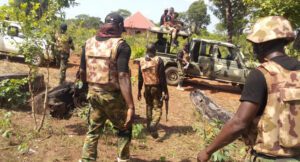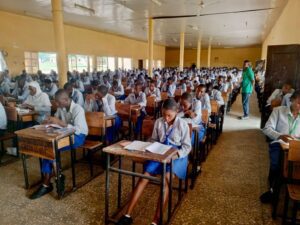Delta Variant – COVID-19 3rd Wave: Necessity of tightening the belt of safety protocols
The scale of the upsurge in the spread of contraction of COVID-19 has begun to assume dimensions of red signals which experts have come to pinpoint as flags of a third wave. The Federal Government has, on the basis of the records of recent surge, declared Nigeria is now in a third wave of the virus. Since the records of the Delta variant with impacts that have cut many Countries in disturbances was discovered in Nigeria, concern over the possibilities of a wide spread of the virus owing to the observed profile of the strong potency of the highly transmissible variant, has attracted new worries.
Warnings over the necessity to tighten the loosened guard has therefore come forth. The call for awakening towards observing the safety protocols has begun to reverberate from government authorities once again. The potency of the Delta variant has been observed by scientific test to be as contagious as chickenpox, as one infected person carries the potential of infecting eight or nine others. Discoveries have also proved the potency of the variant in infecting younger people as against the older strains of the virus.
The easing of guidelines on safety directives since a flattening of the curve of the virus in Nigeria began to take shape in the first of quarter of the year, brought majority of the citizens to a relaxed zone where only an infinitesimal percentage of the population still observe consciously, personal and more importantly, public safety protocols. The surge coming with the discovery of the Delta variant has nonetheless pose the necessity for a return to the conduct of new orders to keep the spread of the virus in check.
Last week, records of daily reports on the cases testing positive to the virus had reflected the surge in the spread of the virus – a development that has called for concern on the need to tighten safety belt. It is observable that the daily profile of positive cases is now pegging at an average of over 700. According to data from the Nigeria Center for Disease Control (NCDC), no fewer than 790 additional infections were recorded last Wednesday which was the highest since February in the Country, while 610 cases were recorded on Tuesday. The Delta variant has been observed by record to be assuming alarming records particularly in Lagos, Akwa-Ibom, Rivers, Oyo states and the Federal Capital Territory (FCT).
It in on record that the NCDC has tested over 2.5 million samples so far in the Country, with an average test positivity rate of six per cent. The active cases in the Country now has soared above 11,000. The funds which this test gulps is, by no small means, enormous enough to boost appreciable development, had they been channelled productively for capital projects. With the state of economic realities and development profile in the Country which is headed for the precipice, it is known that the challenges of wide spread pandemic only holds graver impacts of ravaging effects on the Country.
The surge had informed the Federal Government last week calling on citizens to awake to safety protocols which is important to flatten the curve of the third wave. The Minister of Health, Dr Osagie Ehanire, last Thursday in Abuja at the weekly ministerial briefing organised by the Presidential Communications Team, led by the Special Adviser to the President on Media and Publicity, Mr Femi Adesina, had mentioned the significance of how the role of every individual and organisation will complement the national response by the government.
He was quoted: “If we work together, not only government, it also has to do with citizens, agencies and not the least, the media – we do have a good chance of scaling through this COVID-19 third wave threat. The successful implementation of the non-pharmaceutical interventions and public health measures since we started this vaccination and since this epidemic came in remains very important.Therefore, everyone has a role to play; government, citizens, media, partners, non-governmental organisations, community-based organizations, civil society organizations, traditional rulers, political leaders, and community leaders all have a role to play in this collective effort.
On the recent status of the pandemic in Nigeria, he had said: “As at the Aug. 11, 2021, the government of Nigeria has confirmed the following statistics which by now may have changed a little bit; that the total number of confirmed cases is 179,118, active cases are 10,783. The number of number of discharged cases, 166,144 and sadly the number of fatalities is 2194.
“So we have declared that Nigeria is officially in the third wave of COVID-19 pandemic and as you know, it has already spread in many parts of the world mostly in India where it was first recognised before spreading to other parts of the world and also Africa, including West Africa. Currently, the states that have the highest contribution to the national case load of COVID-19 are Lagos, Akwa Ibom, Rivers, Oyo, Ogun, Ekiti, and the Federal Capital Territory, Abuja. These are the ones we have called the red alert states because they require extra attention to contain the COVID-19 outbreak in those places. The Country is particularly concerned about the Delta variant because it is much more transmissible and it has been estimated to be 60 per cent more transmissible, which means that where one virus of the previous variants would infect 100 people, this particular variant will infect 160 people and that is a lot.
“Secondly, this variant is also of concern because it affects even younger people. Before now we did say that younger people might likely get away or escape from the infection, We expect the vaccination from 18 years upward, but this Delta variant attacks people and we did say that those who suffer most from the other variants are people who have underlying illnesses but this variant seems to care less. It does not discriminate too much whether you have underlying illnesses or not.”
It has proven that the ravages of COVID-19 is no way mild for the conditions of Nigeria. It is pertinent that all hands work cooperatively and collectively to inhibit the ravages of the third wave of the virus. The need for the Government to strengthen enforcement on all safety protocols is sine qua non, just as it is necessary for all citizens to become sensitive to the significance of their obligations in abiding by the established protocols which at large will be of mutual advantage to all.
The impacts of the COVID-19 pandemic has hardly spared any one. The dimensional impacts – socio-economic and political – have further worsened the debilitated fabrics of the working of institutional frameworks of the Country. It is paramount for all sides – individual, organisations, government and other institutions of the Nigerian society – to come to the reality of the necessity to become responsible to the quest of flattening the wave of the virus. Hence, the need for re-tightening the belt of the safety protocols to contain the virus is sine qua non to all.




